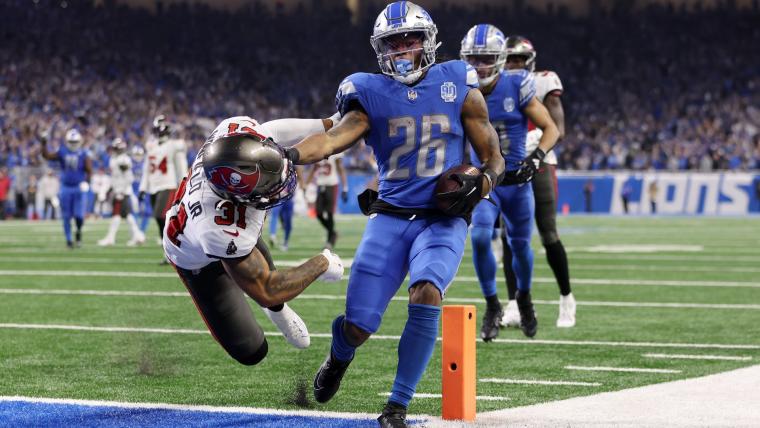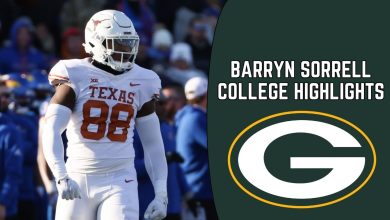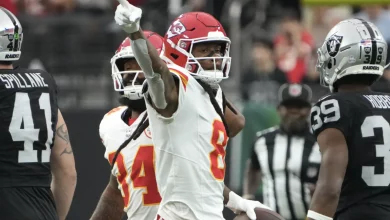Reexamined is Jahmyr Gibbs’ draft: Providing an explanation for the Lions’ questionable running back selection

Reexamining Jahmyr Gibbs’ Draft: Providing an Explanation for the Lions’ Questionable Running Back Selection
When the Detroit Lions selected running back Jahmyr Gibbs with the 12th overall pick in the 2023 NFL Draft, it raised eyebrows across the league. A running back taken so high in the first round—especially in an era where the value of running backs has seemingly declined—was considered a bold and somewhat unconventional move. Critics and analysts alike questioned the decision, considering the Lions’ need for other positions like edge rusher, cornerback, and linebacker, which were seen as more pressing. Moreover, there were several other talented players on the board, such as cornerbacks Christian Gonzalez and Devon Witherspoon, and edge rushers like Tyree Wilson and Lukas Van Ness.
Yet, despite the skepticism, the Lions clearly had a plan in mind when they selected Gibbs. In this article, we will dive into a detailed analysis of the decision to draft Gibbs, the reasoning behind it, and how this move could ultimately pay off for the team in the long run. By exploring the Lions’ strategy, the changing role of the running back in today’s NFL, and Gibbs’ specific skill set, we will offer a broader perspective on what was initially viewed as a questionable pick.
The Context: The Changing Value of the Running Back Position
Before examining why the Lions selected Gibbs, it is important to understand the broader context surrounding the running back position in the NFL. In recent years, the value of running backs has decreased in the eyes of many teams. The rise of pass-heavy offenses, coupled with the emergence of running back by committee systems, has made it less common for teams to invest heavily in the position. The trend of prioritizing quarterbacks, wide receivers, and pass rushers in the first round has resulted in fewer high-profile running backs being selected early.
Over the past few seasons, teams have increasingly turned to cheaper, more flexible running back options rather than using premium draft capital on the position. The most prominent example is the shift away from paying running backs big-money contracts, with star players like Ezekiel Elliott, Le’Veon Bell, and Dalvin Cook facing diminishing returns on their expensive deals. Teams have instead looked to leverage lower-round draft picks or undrafted free agents to fill the running back spot, thus maximizing their cap space for other positions.
Given this context, the decision to select Gibbs with such a high pick seemed counterintuitive to many experts. After all, the Lions already had a solid backfield with veteran David Montgomery, who was signed in free agency. Most teams would have opted to strengthen other areas of their roster with a premium first-round selection.
The Lions’ Offensive Philosophy
Despite the prevailing skepticism, the Lions had a clear offensive identity in 2023, spearheaded by offensive coordinator Ben Johnson and head coach Dan Campbell. Campbell, known for his gritty, hard-nosed approach to football, has built an offense that combines a powerful rushing attack with a highly efficient passing game. The Lions finished 5th in total offense in 2022, with a dynamic mix of play-action passes and a strong ground game.
A major component of this offense was the running game, which utilized both Montgomery and the versatile D’Andre Swift in different roles. However, Swift struggled with injuries and consistency, leading to a situation where the Lions needed a more dynamic, reliable back to complement Montgomery. In addition, Detroit’s offensive line was one of the best in the NFL, and the team was eager to maximize that strength by adding a running back who could take full advantage of it.
In this context, Gibbs represented an opportunity to add a new dimension to the Lions’ offense. Unlike the traditional power backs that Campbell’s philosophy might suggest, Gibbs is a more dynamic and versatile weapon who can operate in multiple areas of the field. He’s a threat both as a ball-carrier and as a receiver, which aligns perfectly with the growing trend in the NFL where running backs are expected to contribute in both the running and passing games. With his exceptional speed, elusiveness, and pass-catching ability, Gibbs is capable of being used in a variety of ways, including as a mismatch creator in space.
Jahmyr Gibbs’ Skill Set and Versatility
When examining why the Lions would use a first-round pick on a running back, the key is understanding the specific traits that Gibbs brings to the table. The Alabama product isn’t your typical, downhill power back; instead, he is a more refined, modern running back built to thrive in today’s NFL.
1. Speed and Explosion
Gibbs has elite speed, which allows him to get to the edge quickly and turn short runs into explosive gains. His 40-yard dash time of 4.36 seconds demonstrates his burst, and he has the ability to break away from defenders in both open field and tight spaces. The Lions’ offense thrives on big plays, and Gibbs can provide that explosive element that can keep defenses on their toes.
2. Pass-Catching Ability
One of the key reasons the Lions selected Gibbs is his ability to be a dual-threat running back. At Alabama, Gibbs showcased his pass-catching skills, finishing his college career with 44 receptions for 444 yards and three touchdowns. He has the ability to line up in the slot or as a traditional running back and make plays in the passing game. This versatility makes him a matchup nightmare for linebackers and safeties, who may struggle to cover him in space. His ability to make plays as both a receiver and a runner gives the Lions’ offense another weapon to stretch the field horizontally, forcing defenses to account for him in multiple ways.
3. Vision and Agility
Gibbs has excellent vision as a ball-carrier, patiently waiting for holes to develop before quickly making decisive cuts. He is capable of making defenders miss in tight spaces with his quick feet and fluid movements. While he may not have the power to break through tackles consistently like Montgomery, his agility and elusiveness allow him to avoid tacklers and gain significant yardage after contact.
4. Coaching Staff’s Confidence in His Fit
Ben Johnson, the Lions’ offensive coordinator, is known for his innovative schemes that emphasize getting the ball into playmakers’ hands. Gibbs’ ability to be used in multiple facets of the game is a perfect fit for Johnson’s system. The coaching staff is eager to integrate Gibbs into both the running and passing games, using him as a versatile weapon to keep defenses guessing.
The Future of the Running Back Position: Why Invest in Gibbs?
The selection of Gibbs should also be viewed through the lens of how the NFL is evolving. While the value of running backs has dipped in certain respects, there is a shift toward finding running backs who can contribute in the passing game. The role of the modern running back is changing: it’s not just about pounding the ball between the tackles anymore, but about creating mismatches in the passing game and providing explosive plays.
With the rise of high-powered offenses, many teams are looking for running backs who can line up in the slot, run routes, and create big plays in the open field. This is where players like Gibbs shine. In the same vein that teams are willing to pay premium prices for pass-catching running backs (e.g., Christian McCaffrey, Alvin Kamara, and Austin Ekeler), the Lions are betting on Gibbs to provide similar value in their offense.
Moreover, the Lions are focused on maximizing their offensive potential. The team is building a potent unit with weapons like wide receiver Amon-Ra St. Brown, tight end Sam LaPorta, and quarterback Jared Goff. Adding Gibbs to this group provides another layer to their offensive attack, offering a dynamic weapon who can do it all.
Addressing the Concerns
While the selection of Gibbs makes sense within the context of the Lions’ offense, it still comes with some risks. The primary concern is the high draft capital used to select a running back, especially when there were other positions of need that could have been addressed, such as cornerback, edge rusher, or linebacker. With the scarcity of top-tier running backs in the draft, it’s possible that the Lions could have found a productive back later in the draft, especially with a solid back like David Montgomery already on the roster.
Additionally, Gibbs will need to stay healthy and prove that he can handle the NFL workload. Running backs, especially those who are expected to play a significant role as both runners and receivers, face a higher injury risk, and the Lions are taking a gamble by investing so much in a position that is often seen as disposable.
However, the Lions appear to be betting on the evolving role of running backs in today’s NFL and believe that Gibbs’ unique skill set can be the key to unlocking their offense’s full potential. If he can stay healthy and adjust to the speed of the NFL, there’s no reason why the pick won’t ultimately pay off.









